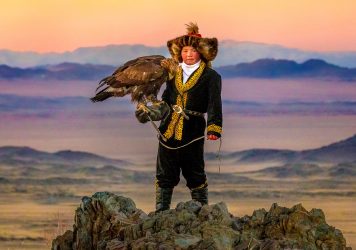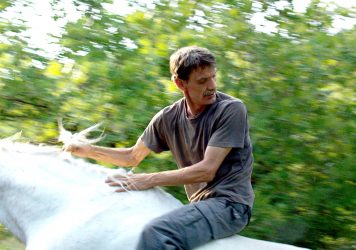Writer/director Chloé Zhao’s spellbinding second feature is a wistful ode to a bygone America.
A man rises up from a bed with a bandage wrapped around his head. There’s a little island of blood and pus which has soaked up through the fabric. Without so much as flinching, he cuts away the dressing with a knife to reveal track-like staples running running like a crescent above his right ear.
This is Brady (Brady Jandreau, playing a lightly-fictionalised version of himself), a Zen-like Dakotan rodeo ace who is lucky to be alive having been stomped on by a wild horse that got the better of him in the ring. He appears remarkably chilled about what is clearly a dire situation, his first order of business being to skip the bed rest that doctors have urged him to take and get back to lasso practice.
Chloé Zhao’s The Rider is a wistful ode to a lost America and to the folks who remain pointedly out of synch with the steady march of progress. Brady’s dilemma is a pertinent one: does he risk life and limb to do the thing he loves, or does he get into boring lockstep with the traditional capitalist system? His dependents include a younger sister with learning difficulties (Lilly Jandreau) and a father with a gambling problem, for whom he dearly wants to provide. He shows no sorrow when visiting his old rodeo buddy Lane, now paralysed and unable to speak. They hoot along to online videos of the glory days, refusing to believe they won’t someday be back on a bucking bronco despite their severe injuries.
Zhao’s restraint is admirable, but there’s a sense that the film is surging towards an inevitable end point where Brady will be forced to choose between a probably painful death and happiness, or life and eternal disappointment. And if there’s any criticism here, it’s that this tried-and-tested story arc doesn’t really offer potential for big surprises. From the first five minutes of footage, you can guess exactly where this one is going to go.
Yet the film is blessed with a number of magical sequences, usually when Zhao’s documentary instinct kicks in and she just observes as Brady weaves his equine magic. Sometimes that’s just nattering to Lilly against the half-light, detailing the bright future he has promised her. Other times it involves his various interactions with horses which channel an aching desire to be cantering across the prairies once more.
Two sequences show Brady breaking in some rowdy colts, and the wizardry he performs is presented on the level of intricate brain surgery. It’s almost as if he is silently communing with the animals and benignly bending them to his will. To complete the transaction, he needs to just hop on their back and ride them around the pen, but he knows his body can’t take it any more.
While Brady blindly romanticises the ways of the Old West and the flinty demands of manhood, Zhao largely dismisses it all as macho bullshit. The film is about Brady developing a sense of his own mortality, and not being able to work with horses is, for him, its own type of slow death. In the end, Zhao suggests that only by living will we discover new possibilities, new hopes and new turns in the road.
There are so many individual moments here that are brilliant, and you might want to bet your life savings that this amazing director will deliver her first masterpiece sooner rather than later.
Published 13 Sep 2018
Plaudits aplenty from the festival circuit. Excited for this one.
A remarkable film in many respects, and Zhao works wonders with a non-professional cast.
The story errs a little on the side of moralism and sentimentality.

By Ed Gibbs
Charlie Plummer proves his acting chops in this equine drama from writer/director Andrew Haigh.

A young girl shows the old men how to hunt with large birds in this charming documentary.

A solitary protagonist searches for human connection in this vibrant drama from director Valeska Grisebach.